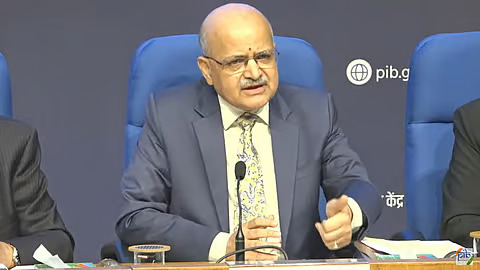- Home
- health
- Digital push in healthcare to turn India global hub of med-tech research and manufacturing, says Niti CEO
Digital push in healthcare to turn India global hub of med-tech research and manufacturing, says Niti CEO

Fortune India
health
9/20/2025Shathamanyu
With a focus on low-cost innovation and strategic Free Trade Agreements, India is set to become a global hub for med-tech research
and manufacturing, attracting international firms, believes Subramanyam
India has a head start in generating digital healthcare data and will soon see a UPI (United Payment Interface) like moment for
new products and services built using such data, BVR Subramanyam, CEO, Niti Aayog, said.
Delivering a keynote address at the 11th Asia Pacific MedTech Forum 2025 in Delhi, Subrahmanyam said that while the rest of the
world is trying to integrate physical data to digital platforms, India is going the digital way to generate data. “The volume of
digital data being generated in India in healthcare is probably unprecedented. That gives us a head start. Others are missing out
on the potential of it; they are missing the big picture. We were doing Aadhaar- bank account-mobile phone linkage, and the moment
you linked all of that, UPI emerged out of it. Similarly, the range of digital data that is coming out, and the amount of data
that is out there, it's just a matter of time before somebody is going to tap into it. That is going to be a major turning point”,
Subrahmanyam said.
He also said India will lead low-cost innovation in med-tech due to the inherent price sensitivity of Indian society. “It is a
price-sensitive market, let’s be very clear, and it is going to continue to be price-sensitive, not because of income, but because
of society’s psyche. Price sensitivity in India is going to drive low-cost innovation, and that’s going to be a major driver of
making India a global hub of med-tech innovation. The entire digitalisation process on our large population is going to play a
major role”, he explained.
Subrahmanyam said India’s gradual integration on the medical side with the rest of the world will also attract global med-tech
companies to set up research and manufacturing bases in India. The Free Trade Agreements (FTAs) India has signed with countries
like Australia, UAE and UK and the ones that are being negotiated with several others, including the EU and Canada, are also
turning India into a more attractive destination for med-tech firms, he said. “For a large number of medical technology companies,
India is going to be very attractive. And I am not looking at medical devices as a vertical. I am looking at it horisontally. This
is happening in semiconductor space, manufacturing space, all of that put together creates an ecosystem in India to become a hub
of medical device manufacturing”, he said.
According to Subrahmanyam, India is already a huge healthcare market, and there is going to be a huge medical device market as
well. “The Indian medical device market will be three or four times bigger than its current size in the next 5-7 years. And if you
look at 25 years, it will certainly be 10-12 times”
Recent news
Related News

Balancing Innovation and Safety: The Ethical Dilemma of New Surgical Techniques
9/21/2025 Shathamanyu

New AI model predicts susceptibility to over 1,000 diseases
9/20/2025 Shathamanyu

